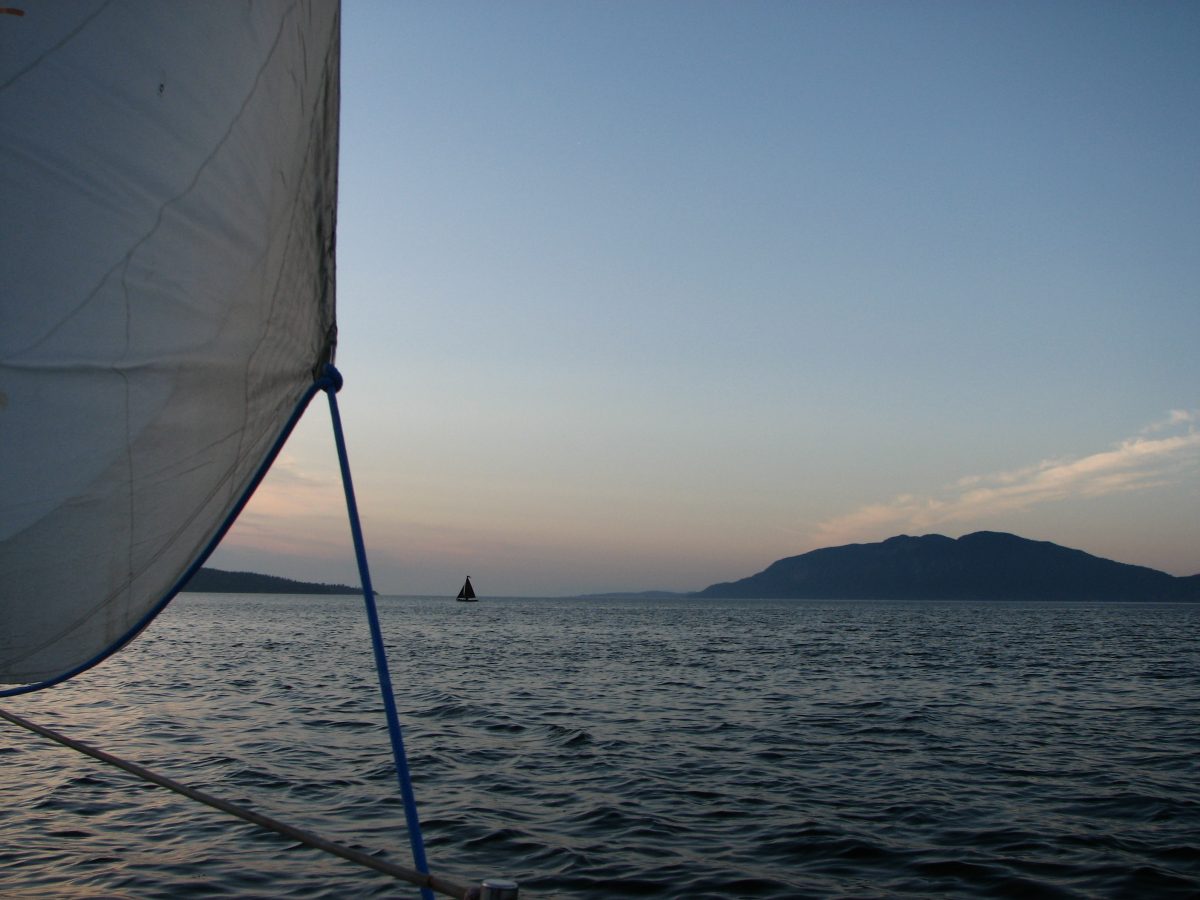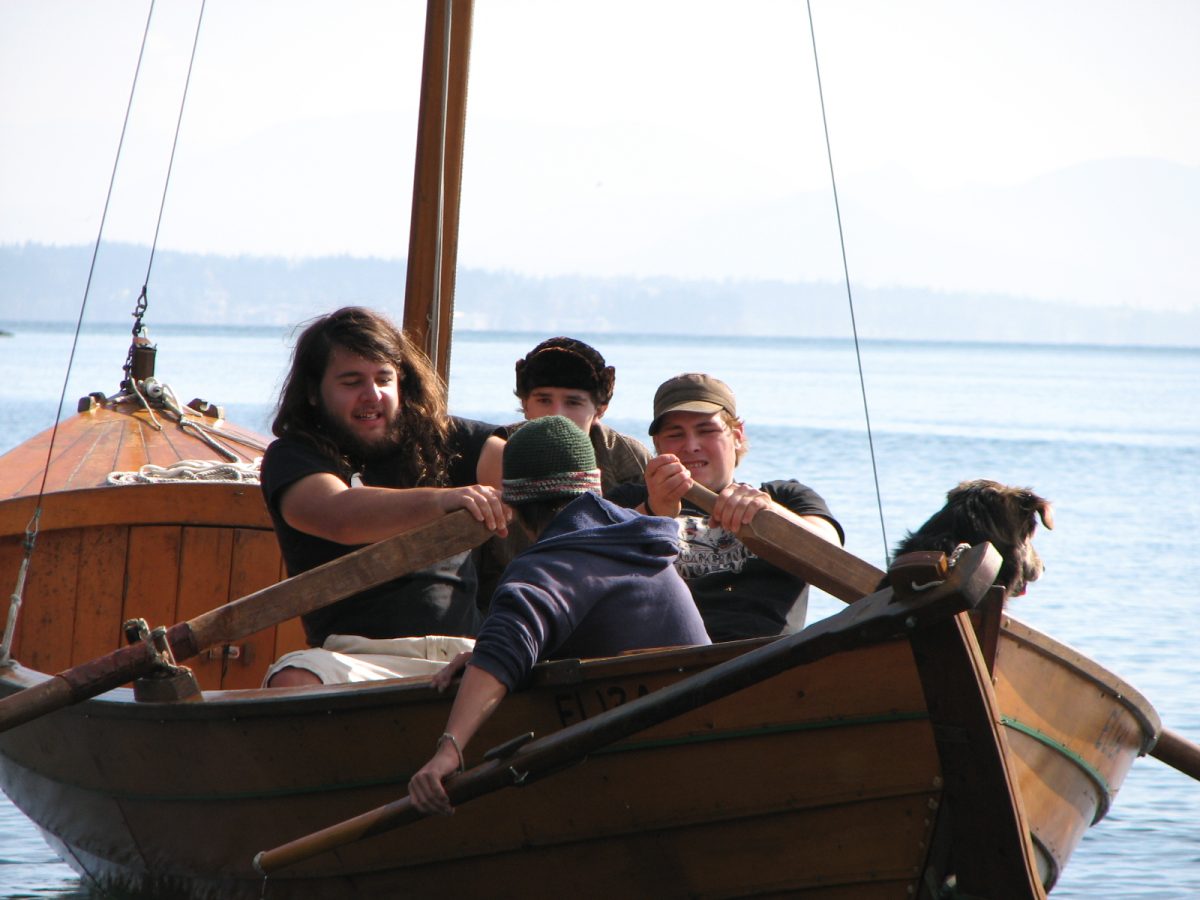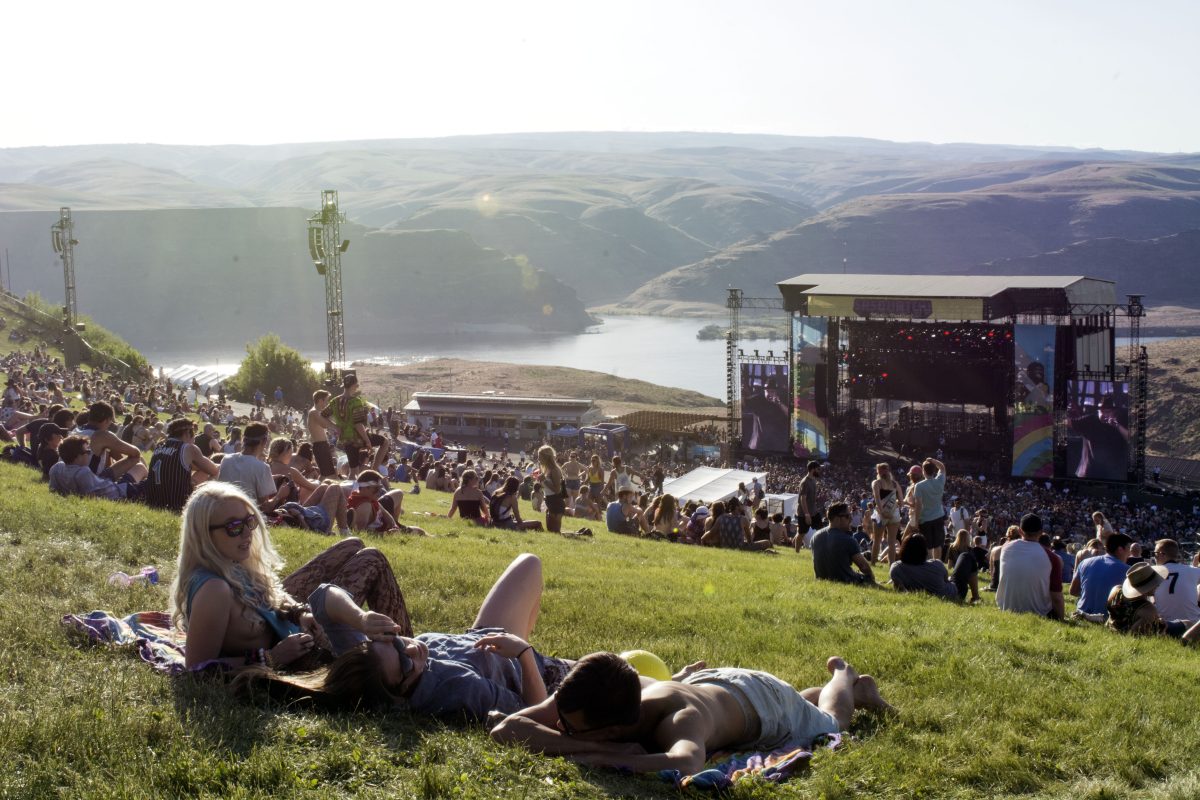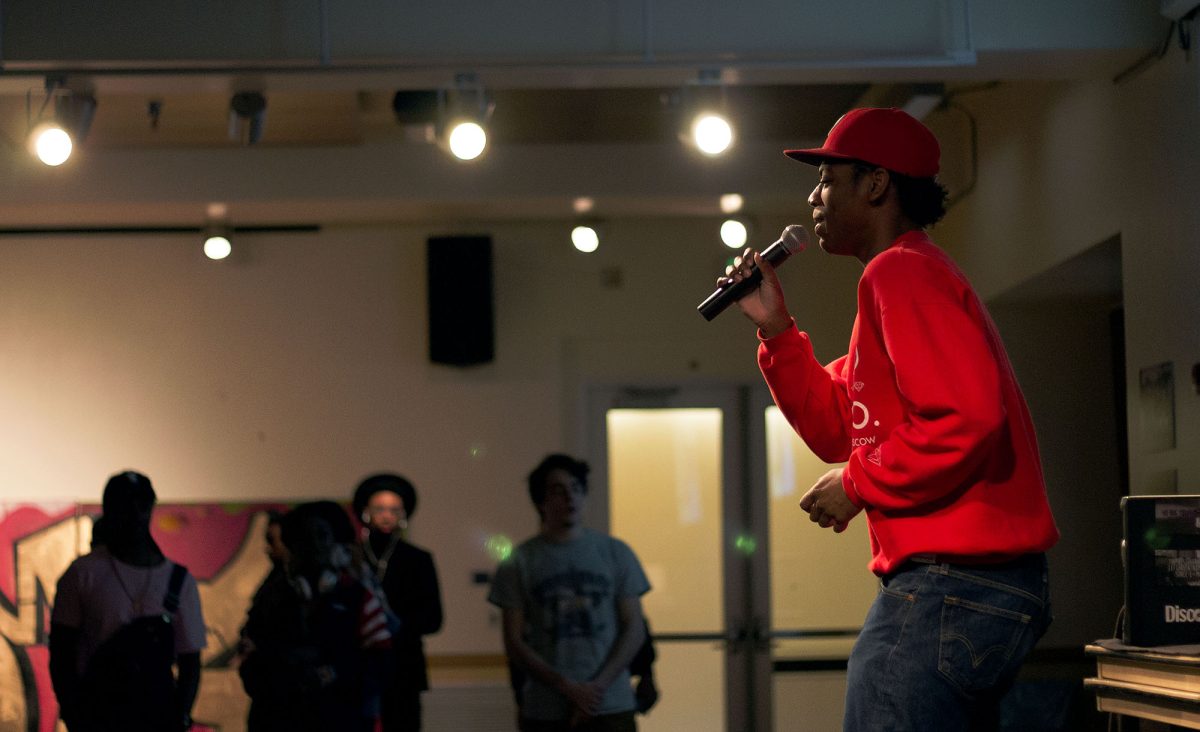Story and Photos by Stefan Verbano
Illustration by Chelsea Pero
Moving to Eugene was like immigrating to a different country. This town made its strongest and most enduring impression on me in September 2008, on the Saturday before the first week of class. I drove the 350-plus miles south with my family, and, after arriving and moving a carload of boxes into my tiny dorm room, we headed downtown. As traffic crept along Franklin Boulevard, I gazed out of the passenger side window into the sunshine and witnessed my first reminder of island life: people waved as they passed each other on the sidewalk. Whether they were complete strangers or a large group of friends who had coincidentally been walking the same couple of blocks did not matter to me. The important thing was that this small city felt different from the dozens of others I had passed through in my life where the coldness and blank forward stares of anonymity ran deep. Eugene emanated that day with a feeling of community.
The Saturday Market hit me like a bag of bricks. If I could have taken a magic paintbrush and glossed over the towering buildings and jutting concrete with a scene of green rolling hills and trees, I would have thought I was at Woodstock. Tie-dye enveloped everything, and the sweet sounds of twanging guitars and beating drums combined with laughter and the chatter of commerce into a dull roar. Everyone was smiling. The afternoon sun illuminated the bright colors of homemade clothing and jewelry and I felt like I was walking through a bustling rainbow. I let my ears lead my feet, and ended up at the corner of 7th and Oak. There, on the steps of the Lane County Courthouse, I found a semicircle of drummers and dancers completely engulfed in rhythm. Some were dressed in tattered blue jeans and wool sweaters, sporting long, coarse, beaded dreadlocks, while others wore immaculate white sundresses or hibiscus-print aloha shirts. The air smelled like lavender and reefer. I found a cement ledge to recline on and closed my eyes. All of the sudden I was sitting next to a bonfire in the middle of a moonlit field on Guemes Island, surrounded by a similar semicircle of drummers, as their tumult of drunken laughter and slapping snare and bass tones mixed with frog croaks and the crackle of seasoned firewood. For a moment in my mind, these two vastly different places were one.
Unfortunately, this fleeting first impression of Eugene has not held true. Though my time here has been punctuated with similar scenes of jovial hippies and feel-good impromptu art, I cannot help but feel that many aspects of this new urban atmosphere are irreconcilable with the idyllic lifestyle I used to lead.
I was born and raised on Guemes Island, and lived eighteen years in a log cabin that my parents built out of debarked fir trunks. My stomping ground was twenty acres of swampy clearings, surrounded by an encroaching forest of alder, cedar, and maple trees. Less than 300 people live on the three mile-long island, making it a place where the prevalence of satellite Internet and luxury cars contrasts sharply with the two-lane gravel roads and lone general store which locals aptly call “The Store”. The mainland town of Anacortes is the closest thing to civilization, separated from the island to the south by the mile-wide Guemes Channel.
I twiddled my thumbs through a seven minute ferry ride twice a day for my entire grade school life. Though one might think growing up in such a rural atmosphere would make me question the significance of institutional education, I managed to stay motivated in finishing high school and applying to college. At the same time, everywhere around me I was influenced by the idea that self-reliance was equally if not more important than intellectualism. This dilemma came at a time when I was socially expected to choose the road of higher education; to trade in my knowledge of crab fishing, sailing, and carpentry for a liberal arts education grounded in rationalism and logic. Most of my old friends on the island did not go to college. Rather, they used their intelligence to grow the food they eat or build the houses they live in. Moving to Eugene and continuing school has forced me to value one lifestyle over another, but I can never relinquish the idea that knowing how to sail a boat or fell a tree is somehow more valuable than knowing how to take an exam or throw a little orange Ping-Pong ball into a keg cup.
Guemes Islanders value chainsaws and overalls over newspapers and Twitter feeds, yet still manage to stay as politically involved as Eugene locals. When the evening operating hours of ferry service to the island were extended from 6 to 10 p.m, pick-up truck loads of disgruntled residents arrived at the dock. Their grievance was that extended ferry service made island life more comfortable, which in turn increased population and eroded Guemes’ rural character. So, over the period of a week, hundreds of people stood draped in American flags, holding picket signs, blocking traffic, and singing songs. With applause and cries of approval from protesters, a ragtag group of particularly brave locals donned ski masks and strung a twenty-foot tall black banner from the dock that read “Guemes Mourns.” I cannot help but assume Eugene shares a similar thread of alternative activism as I hear of a time when anarchists were smashing store windows and student activists were protesting Nike sweatshops by sleeping in tents outside Johnson Hall.
Guemians are able to live so freely due to the lack of law enforcement. Not only is there no police station or patrolling officers on the island, but even the notion of law and that certain acts are “illegal” is essentially up for interpretation. Guemes is the kind of place where you could walk down the main road smoking a joint and not be given an ounce of guff by anyone. Victimless crimes go unpunished, but a tightly-knit communication network of neighbors and friends ensures that perpetrators of more serious crimes are publicly persecuted. This philosophy that you shouldn’t “shit where you eat” allows many residents to leave their doors unlocked and keys in the ignitions of their cars. Maybe it’s the fact that many residents live in the forest and keep to themselves, or maybe it has to do with the kind of people the island attracts, but I can confidently say that living on Guemes was the closest I have ever come to being absolutely free. I am not saying that islanders don’t commit crimes; they are just under the abstract impression that laws are substantiated within their own consciences rather than within some dusty courthouse tome.
It is not uncommon for the usual gaggle of barflies to be kicked off their stools when the bar in the general store closes at 8 p.m, forcing a dozen old, rusting Toyota pickups and Chrysler Plymouth Voyagers out onto Guemes’ narrow 35 mph roads. Now, before all the straight readers grumble and vow never to vacation on the island, they must understand that most of the dangers of drunk driving in the city are nonexistent in the country. Car accidents, especially those involving collisions, are very rare thanks to the fact that intoxicated locals drive slower as the evening progresses. Common late-night goodbyes often take the form of advisory catch phrases like “drive five, stay alive” and “look out for the three Ds” (dogs, deer, and ditches). Many locals also refuse to pay for car insurance on the grounds that they are perfectly safe drivers and that a lifetime of monthly membership dues will end up costing more than their actual vehicles. If someone is unfortunate enough to get into a low-speed accident with another local where no one is injured, the drivers will usually examine their crumpled fenders or bashed out headlights, chuckle together for a moment, and contemplate the easiest quick fix. A community that drives old Toyotas instead of new Lexuses has no need for traffic laws, police, or auto insurance.
Unfortunately, Eugene cannot boast this kind of individual autonomy. Despite its throngs of retired hippies and championing of multiculturalism, this town has a palpable rule of law. Before coming here, I had this idealistic image in my mind that Eugene cops would reflect some of the town’s character, perhaps sporting long hair, faded blue jeans, and smiles. I felt that to police a town full of freaks they would have to serve more as moral guides than as the strong arm of the law. I was wrong. The Eugene Police Department scours the streets on Friday and Saturday nights like navy blue commandos, using the variety of menacing tools on their belts to abate crimes like vandalism, public drunkenness, theft, and street violence. Their faces are stern as they break up house parties and dole out MIPs. I had lived eighteen years without being forced to interact with the embodiment of law, and now am forced to introspectively consider whether I feel safer knowing someone with a badge and a gun is around every corner with the job of protecting me. When I witness people breaking bottles on car windows or throwing drunken punches, I can’t help but feel like a police presence is necessary. At the same time, I remember that there is an island in Northwest Washington where the lack of law enforcement has forced people to govern themselves and to place the duty of crime prevention into the hands of the populous.
Mistrust must have germinated from these fears of crime and police harassment because before I can get my foot in the door of some house parties, I am unashamedly prompted with the question “Who do you know here?” I guess that in the city, all you are is who you know. If I manage to answer this question correctly, the retort is usually something like “Alright, man, just don’t steal anything.” I remember being really bothered the first time I had to explain myself to a doorman, simply because I was not used to being anonymous. On Guemes, it was impossible for me to be a stranger. But here, in this swirling world of loosely-connected names and faces, people see my long hair and ragged clothes and assume that I am there to pick through their garbage. Barred windows, security gates, bike locks, illuminated walkways, and pepper spray are all prevalent in this town because there is a genuine lack of trust among members of the community. So, when I am headed home after a long night and see the vulnerable and obviously intoxicated young woman dressed in high heels and a black mini skirt stumbling down the sidewalk, I cannot help but wish she was instead walking the dark, winding country roads on Guemes. At least there, the worst thing she will be given by a late-night passerby is a ride and a prayer.
My old island friends and neighbors were so inimical toward the notion of law enforcement that they would often take it upon themselves to do the community’s dirty work. Two years ago, an elderly, well-respected pack rat left the state for a week. He owned a seven-acre plot of land that he liked to call “The Museum,” which was little more than an overgrown field full of rotting boats and a myriad of other flotsam. The property had become so cluttered that the county was about to foreclose on it, so, night after night, a congregation of the owner’s concerned friends labored away. We ripped half-century old rowboats out of story-high blackberry brambles, using a tractor to jostle out the jagged planks piece by piece and drag them towards the waiting bonfire. I stood by idle and awestruck as one of my friends mounted an overturned boat engulfed in flames and repeatedly bashed its hull with a sledgehammer to facilitate oxygen flow. Fuming black, acrid smoke from burning lead bottom paint made him drift in and out of sight, and I will never forget the sickening sound of steel against wood as the hammer’s slow reverberations echoed into the thickly wooded darkness. Regrettably, such benign anarchism has no place in suburbia.
Categories:
Lost Impressions
June 1, 2010
Lost Impressions
0
Donate to Ethos
Your donation will support the student journalists of University of Oregon - Ethos. Your contribution will allow us to purchase equipment and cover our annual website hosting costs.
More to Discover















